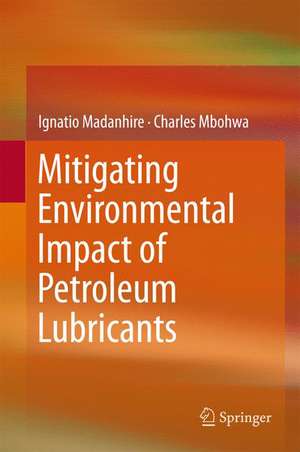Mitigating Environmental Impact of Petroleum Lubricants
Autor Ignatio Madanhire, Charles Mbohwaen Limba Engleză Hardback – 16 iun 2016
This book provides readers with strategies for incorporating cleaner production practices into their operations – a benefit to both environmental legal compliance and business competitiveness – all the while preserving the environment for sustainable development. The book is therefore of interest to both manufacturers and consumers in the lubricants industry.
| Toate formatele și edițiile | Preț | Express |
|---|---|---|
| Paperback (1) | 386.61 lei 43-57 zile | |
| Springer International Publishing – 31 mai 2018 | 386.61 lei 43-57 zile | |
| Hardback (1) | 393.90 lei 43-57 zile | |
| Springer International Publishing – 16 iun 2016 | 393.90 lei 43-57 zile |
Preț: 393.90 lei
Nou
Puncte Express: 591
Preț estimativ în valută:
75.37€ • 78.91$ • 62.37£
75.37€ • 78.91$ • 62.37£
Carte tipărită la comandă
Livrare economică 07-21 aprilie
Preluare comenzi: 021 569.72.76
Specificații
ISBN-13: 9783319313573
ISBN-10: 3319313576
Pagini: 218
Ilustrații: XXVIII, 239 p. 73 illus., 30 illus. in color.
Dimensiuni: 155 x 235 x 16 mm
Greutate: 0.55 kg
Ediția:1st ed. 2016
Editura: Springer International Publishing
Colecția Springer
Locul publicării:Cham, Switzerland
ISBN-10: 3319313576
Pagini: 218
Ilustrații: XXVIII, 239 p. 73 illus., 30 illus. in color.
Dimensiuni: 155 x 235 x 16 mm
Greutate: 0.55 kg
Ediția:1st ed. 2016
Editura: Springer International Publishing
Colecția Springer
Locul publicării:Cham, Switzerland
Cuprins
Lubricant environmental impacts.- Green lubricant design and practice aspects.- Synthetic lubricants.- Development of biodegradable lubricants.- Environment and the economics of long drain intervals.- Recycling of used oil.-Future lubricant trends.
Notă biografică
Ignatio Madanhire is a Lecturer and a Researcher in industrial and engineering management with a focus on sustainable development and environmental preservation. He has served as a Mechanical Engineer for the Government of Zimbabwe. He has also served as a Lubrication Engineer with Mobil Oil International and Lubricants Business Development Manager with Castrol International. He is currently a Lecturer in Mechanical Engineering Department at the University of Zimbabwe. In addition, he is a consultant in industrial lubrication and manufacturing systems. He is member of the Zimbabwe Institute of Engineers
Charles Mbohwa is an established researcher and professor in operations management, manufacturing systems, green supply chain management and sustainability engineering, optimization, and his specialisms include renewable energy systems, and bio-fuel feasibility.
Charles Mbohwa is an established researcher and professor in operations management, manufacturing systems, green supply chain management and sustainability engineering, optimization, and his specialisms include renewable energy systems, and bio-fuel feasibility.
Textul de pe ultima copertă
This book explores effective environmental impact mitigation for petroleum-based lubricants to reduce their negative persistence during usage and upon end-of-life disposal. The book reviews the basic tribology of lubricants as well as initiatives that may enhance the environmental and economic effectiveness of lubricating oils from the composition design perspective across industries. Considering the blending, application, and disposal of petroleum lubricants in a holistic manner, the book presents and extends current best practices that minimize or eliminate adverse environmental impact throughout the product’s life cycle. The book reviews methods including: raw material substitution, minimizing oil losses during and after manufacturing, raw material and energy consumption reduction, and environmentally friendly applications of oil disposal as ways forward for cleaner and more effective production.
This book provides readers with strategies for incorporating cleaner production practices into their operations – a benefit to both environmental legal compliance and business competitiveness – all the while preserving the environment for sustainable development. The book is therefore of interest to both manufacturers and consumers in the lubricants industry.
This book provides readers with strategies for incorporating cleaner production practices into their operations – a benefit to both environmental legal compliance and business competitiveness – all the while preserving the environment for sustainable development. The book is therefore of interest to both manufacturers and consumers in the lubricants industry.
Caracteristici
Highlights challenges in the lubricant production cycle, and details how these can be handled in an environmentally friendly manner Shares important information for lubricant manufacturers on how to incorporate cleaner production practices into their operations Investigates existing cleaner production practices by manufacturers and users of lubricants, and builds on these findings Includes supplementary material: sn.pub/extras





